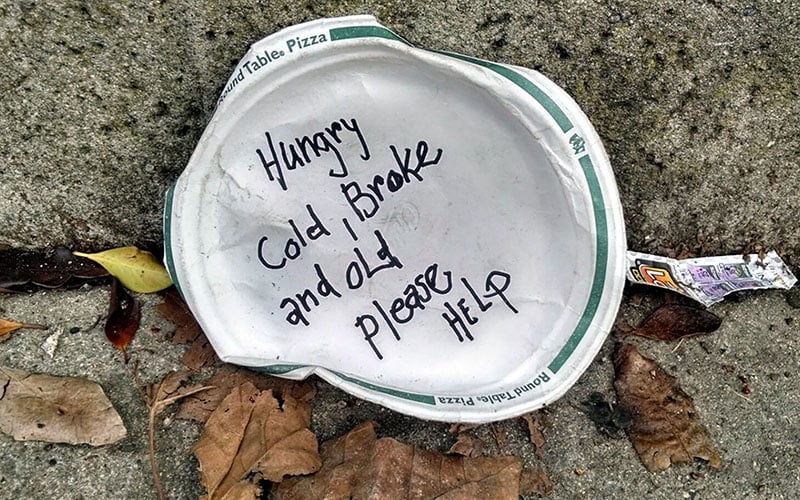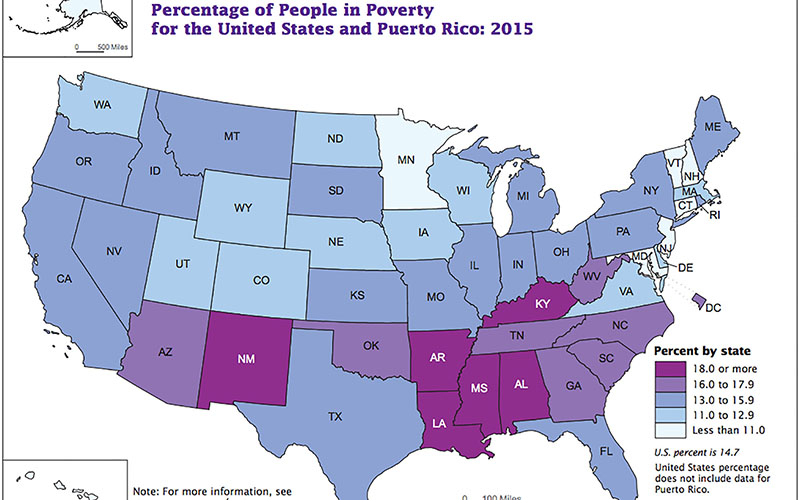
A drop in poverty was one of a wave of good economic reports from the Census Bureau this week, which also said incomes were up last year and the number of people without health insurance was down. (Photo by Travis Wise/Creative Commons)

Arizona’s poverty rate fell from 18.2 percent in 2014 to 17.4 percent last year, mirroring a national trend. Despite the improvement, Arizona was still among the 10 highest states for poverty last year. (Photo courtesy Census Bureau)
WASHINGTON – Arizona saw a “significant” drop in its poverty rate last year, but that rate still hovered well above the national average, according to numbers released Thursday by the Census Bureau.
The bureau said Arizona’s poverty rate fell from 18.2 percent of the state population in 2014 to 17.4 percent in 2015. Nationally, the rate fell from 15.5 to 14.7 percent in the same period.
The Census also showed poverty falling in the Phoenix-Mesa-Scottsdale metropolitan area, from 17.2 percent to 16.2 percent last year.
But, as with the state, the metro-area numbers remained stubbornly high compared to other large urban areas. Phoenix had one of the highest poverty rates among the 25 largest metro areas in the report.
The falling poverty numbers were part of a wave of good economic reports this week from the Census that “can only be described as excellent news,” said Robert Greenstein, president of the Center on Budget and Policy Priorities.
See related story:
Apache County had worst ‘food insecurity’ in U.S.; state also fared poorly
Besides the falling poverty levels, the bureau said median household income rose 5.2 percent to $56,516 last year, the first increase since 2007, the year before the recession began. And the number of people without health insurance fell from 10.4 to 9.1 percent last year.
“For the first time since 1999, the three key indicators of well-being in the Census reports – median income, poverty and health coverage – all move decisively in the right direction in 2015,” Greenstein said.
But one Arizona expert cautioned that while the improving numbers are welcome, they may mask growing income disparity in the state.
“We’re still seeing a recovery in a lot of ways, seeing people try to get back to the point where they were before the Great Recession,” said Michael S.C. Soto, the economic equity policy manager at the Arizona Community Action Association.
“Both the income and wealth gaps are growing,” Soto said. “There’s a smaller percentage of money available to everyone who isn’t at that top class, because that money is stuck at the top, so it needs to recirculate.”
Soto said the improvements seen in this year’s numbers could level off in coming years if the state and national economies don’t continue their recoveries.
But other analysts said the numbers should continue to improve, although it will depend on other factors like “inflation, the strength of the job market, and the breadth of the (economic) recovery.”
Dan Hunting, a senior policy analyst at the Morrison Institute for Public Policy at Arizona State University, said the changes to the state’s poverty rate from 2014 to 2015 were “statistically significant.”
“The economy is improving, so that will bring more people out of poverty,” Hunting wrote in an e-mailed statement. “Things are getting better overall, so Arizona benefits from that.”
The White House was quick to praise the numbers this week, saying Tuesday that the data show “the remarkable progress that American families have made as the recovery continues to strengthen.”
“Solid employment growth and robust real wage growth so far this year suggest that incomes are continuing to rise in 2016,” the White House statement said. “Building on the progress shown in today’s Census report, the president will continue to call on Congress to take steps to invest in job creation, wage growth and equal pay for equal work.”